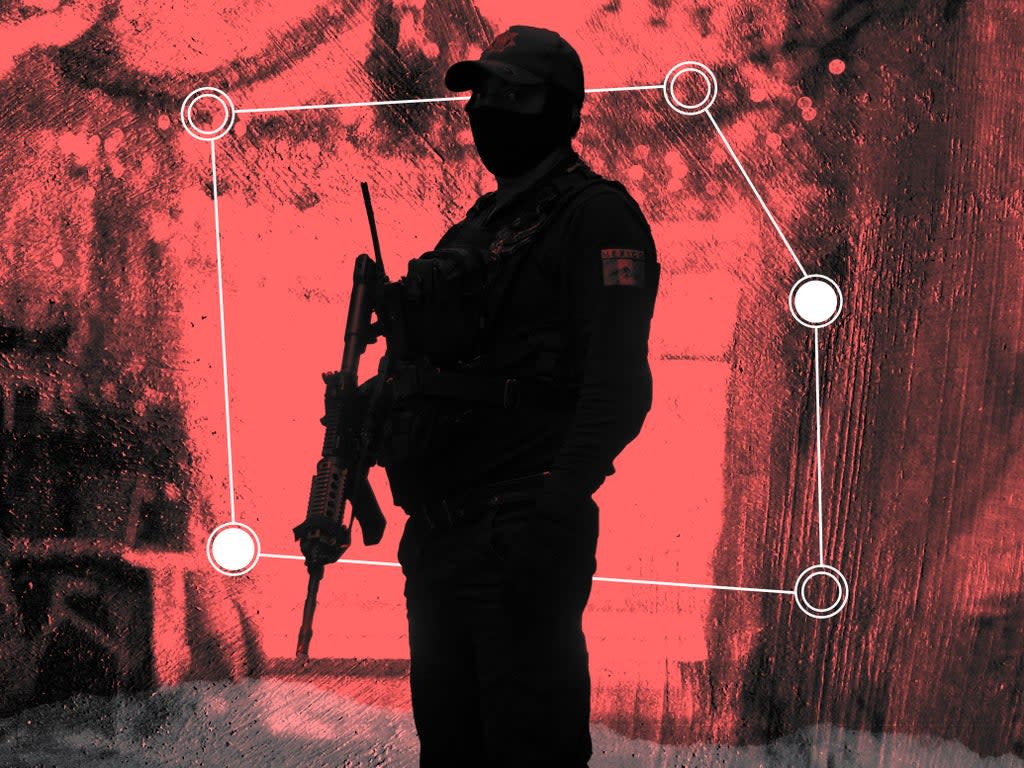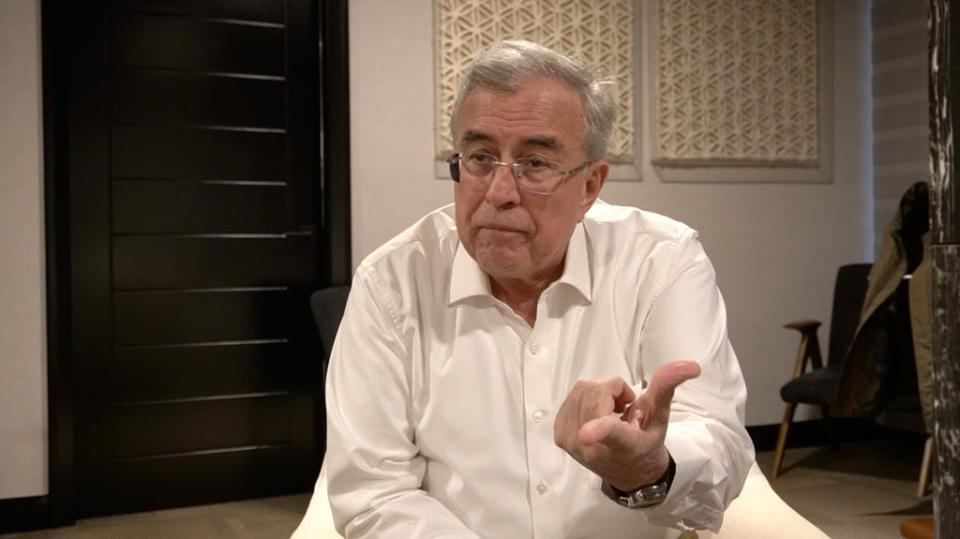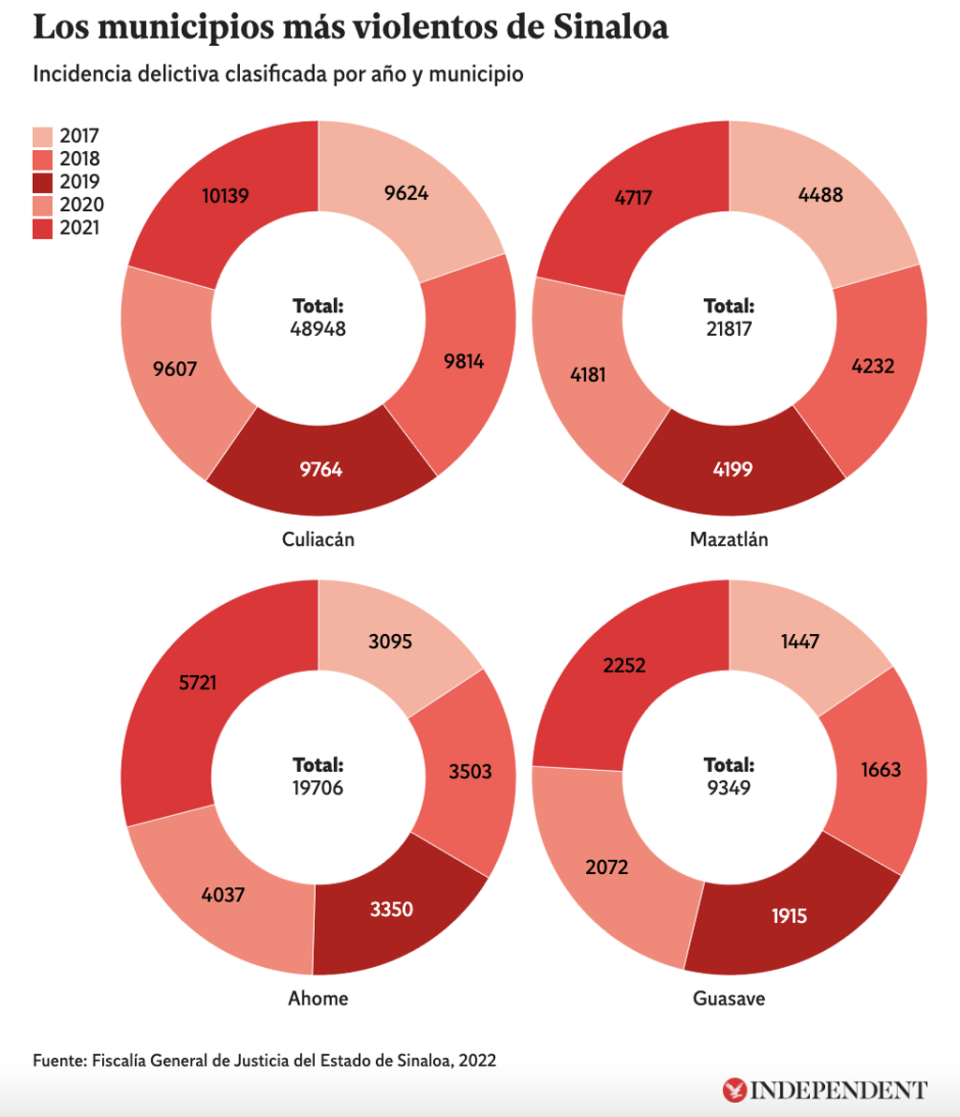Sinaloa governor on leading a region under the thumb of drug cartels: ‘We handle it’

- Oops!Something went wrong.Please try again later.
In the midterm elections of June 2021, Rubén Rocha Moya was elected governor of the Mexican state of Sinaloa, snatching the position from political rivals with 55.8 per cent of the total vote, according to data from the INE (National Electoral Institute). He won by a wide margin of nearly 25 per cent, with his closest opponent Mario Zamora, from the coalition of the PRI (Institutional Revolutionary Party), PRD (Party of the Democratic Revolution) and PAN (National Action Party), securing just 31.1 per cent of the vote.
Rocha Moya governs under the protection of Morena (National Regeneration Movement), the party that Mexico’s president Andrés Manuel López Obrador (AMLO) founded in October 2011. Like almost all the Morenoite state leaders who took power last year, Rocha Moya has adhered from day one to the rules, beliefs and even maxims of AMLO, who asked for the "blind loyalty" the governor practices every day.
Sitting at his desk in a very casual outfit, without appearing luxurious or displaying the power that his position confers, he answers questions from Independent en Español emphatically, as any ‘culichi’ (citizen of Culiacán) would. Some are uncomfortable, others do not concern him but represent a challenge, a few months after taking office.
The fight against organized crime is the main issue on the state agenda:
“Security is a topic of concern for the governments of Mexico and even the world. We are followers of President López Obrador and our strategy is his. We need to give a sense of life to all the poor who live in marginalization, not only to feed themselves, but to provide them with education, culture, sports and a way of living with dignity. People often act out of hunger, lack of culture, lack of attention from the authorities.”
In an interview with Independent en Español, Rocha Moya assures that “the use of force by the State is imperative to prevent and prosecute crimes in order to avoid impunity”. And he remarks: “The crime that is committed and not punished is a crime that is repeated. We are going to act accordingly and, in the three months that I have been in charge of the State Government, we are doing it.”
Convinced that AMLO’s anti-crime policy of “abrazos, no balazos” "(hugs, not bullets) means applying preventive action to address the causes that generate crime, the governor assures that "economic and social assistance, job opportunities, the generation of places of recreation, educational and cultural coverage, and addressing health problems, are the hugs that the government should give”.

In previous administrations, the people of Sinaloa were embraced, but by organized crime. According to figures from the FGE (State Attorney General’s Office), in 2021 alone, the municipalities that recorded the highest number of crimes were Culiacán, with 10,170; followed by Ahome, with 5,734; Mazatlan, with 4,725; Guasave, with 2,257; and Navolato, with 824. In the last five years, crimes have been on the rise. In the capital of Sinaloa alone, 9,625 crimes were registered in 2017; 9,814 in 2018; in 2019, it decreased slightly to 9,768 crimes; in 2020, it had another slight decrease with 9,610; but in 2021, it increased to 10,170 crimes.
The governor assures that “there is a stigma that we are going to fight because we are not a violent state”. Sinaloa is no longer among the most conflictive regions of the Mexican Republic, as it was during the six-year term of former president Felipe Calderón Hinojosa from 2006 to 2012. Now the top spots are held by states like Zacatecas and Guanajuato, which are in dispute between the Sinaloa Cartel and the CJNG (Jalisco New Generation Cartel), commanded by Nemesio Oseguera Cervantes, alias "El Mencho."
However, Sinaloa still records more federal crimes than Mexico City, in its division of “crimes against health”. In 2021 alone, the Ministry of Security and Citizen Protection recorded 20 cases of drug production in Sinaloa, while in the capital of the country only two were registered. Regarding cases of drug transportation, 155 were recorded in Sinaloa and 42 in Mexico City. Regarding the possession of drugs, Sinaloa registered 136 cases that include consumption; while the capital had 57.
Speaking to Independent en Español, Rocha Moya at times turns to the back wall, as if wanting to draw attention to his governor certificate for the period from November 2021 to October 2027. However, what stands out is one of AMLO’s books on top of a large wooden cabinet, titled A La Mitad Del Camino (Halfway Through The Road). The book is new, still shiny with the plastic covering intact. Rocha Moya stares at the camera and continues answering.
Is it possible to govern Sinaloa without agreeing with organized crime groups?
Rocha Moya: "Of course. Neither we nor President López Obrador have a pact with drug trafficking. We attend to what corresponds to the State Government, regarding crimes of common law, those that persecute our local institutions. We have no need to make a pact with anyone. We don’t have it."
He has no agreements, he says; but it cannot be ignored that there are characters like Ismael "El Mayo" Zambada, who have a great capacity to operate illicit businesses in the state...
Rocha Moya: “You cannot ignore what is going on in your state, but there is no need to have relationships, pacts or understandings with crime. That is not one of the inclinations that my government has. López Obrador’s mandate and ours fully coincide, since we have to be aligned with the National Security Strategy, that is, to prevent crime, attacking the causes that generate it; and apply the use of force, to attend to the prosecution of the offense.”
Rocha Moya’s predecessor Quirino Ordaz Coppel, the former PRI governor, ended his tenure at the head of Sinaloa – according to the opposition political parties – “benefiting organized crime groups”, specifically, Joaquín’s children “ El Chapo” Guzmán, known as “Los Chapitos”; and Ismael “El Mayo” Zambada, the longest-serving leader of the cartel.
According to Sinaloa government figures, marijuana seizures fell dramatically under Ordaz Coppel’s leadership from 2017 to 2021. During his first year in office, 16,152 doses of marijuana were seized; followed by 10,601 in 2018, 1,017 in 2019 and 1,217 in 2020. As of last September, only 234 had been seized in 2021.
Methamphetamine seizures during Ordaz Coppel’s administration followed a similar course. In 2017, they secured 29,118 doses; followed by 12,842 in 2018, 2,089 in 2019, 2,140 in 2020 and 1,332 in 2021.
The same trend occurred with cocaine, as just over 13,200 doses of cocaine were seized in his first year, and only 154 in his last.

If this course continued, the Sinaloa Cartel as of today would be operating with absolute freedom and impunity in the demarcation and, furthermore, exercising the maxim of the “pax narca”: “live and let live”. A negotiation or “unwritten pact” that would strengthen the complicity between the State and its criminals.
The governor puts his hand to his mouth and insists: “We do not have pacts with organized crime. We have a security table every day, we examine what happened the day before and, based on it, we reflect and try to take measures to avoid the greatest possible criminal incidence.”
In December 2021, just a few months after taking office, Rocha Moya witnessed the power of the Sinaloa Cartel and one of its rising leaders: Aureliano Guzmán Araujo, alias "El Guanito", the nephew of Joaquín "El Chapo” Guzman. It came when a fight broke out between patrons at the Casanova bar on Diego Valadez Boulevard, in front of the Lucerna Hotel, three kilometers from the Government Palace.
According to police, an argument about “El Guanito” and members of the criminal cell he commands led to one man brandishing a gun and shooting another, injuring him. Surveillance videos showed there were at least three armed subjects. Agents from the State and Municipal Police arrived at the incident to intercept the aggressors, but seeing themselves outnumbered and overpowered, they simply withdrew from the scene.
Does the state force have the capacity to handle security crises, like the one experienced a few months ago at the Casanova bar?
Rocha Moya: “We handle it. Who came to handle it? Did England or the United States come to help us? Well no!"
There were no arrests or punishments for this violent act...
Rocha Moya: “It was followed up, yes; but there is no natural person who is in custody because they escaped. However, all measures were taken and we prevented things from escalating. It was a media scandal, but we pursued it, that is, the State Police and the Municipal Police. Yes, there is capacity for these operations, there is response capacity.”
When asked for information about the shooting incident, both the management and the staff of the Casanova bar stayed quiet for fear of reprisals from the authorities and from criminal groups in the area.
For his part, Rocha Moya assures that his government coordinates with all state and federal law enforcement entities. However, after the shooting at the Casanova bar and, months before, after the so-called "Culiacanazo", it was assumed that the actions of justice in Mexico appeal more to political pressure from the US than to the country’s own intelligence.
Recently, the DEA (US Drug Enforcement Agency) increased the reward to $5m for anyone who provides information leading to the capture of the children of "El Chapo" Guzmán. In this regard, does the Government of Sinaloa work with federal or international agencies to achieve the apprehension of the alleged suspects?
Rocha Moya: “No, it is not our responsibility. It is federal jurisdiction.”
And you, as a state government, do not support the federal government?
Rocha Moya: “Yes, we support, if the federal government invites us. Although, many times the federal government acts and, for fear that the states leak information, they do not request help.”
Do you have any plan to apprehend Ismael "El Mayo" Zambada, the children of "El Chapo" Guzmán or any key member of the Sinaloa Cartel?
Rocha Moya: "For now, we don’t have a plan for the case."
The camera stops filming and Rocha Moya picks up a copy of the local newspaper Ríodoce, one of the most critical of the state government. One headline on the cover stands out as a damning sentence for Sinaloans: “They will come for the capos and the problem will continue.”
This story was originally published by Independent en Español in Spanish and has been translated to English for The Independent. Read part one of the series here.

